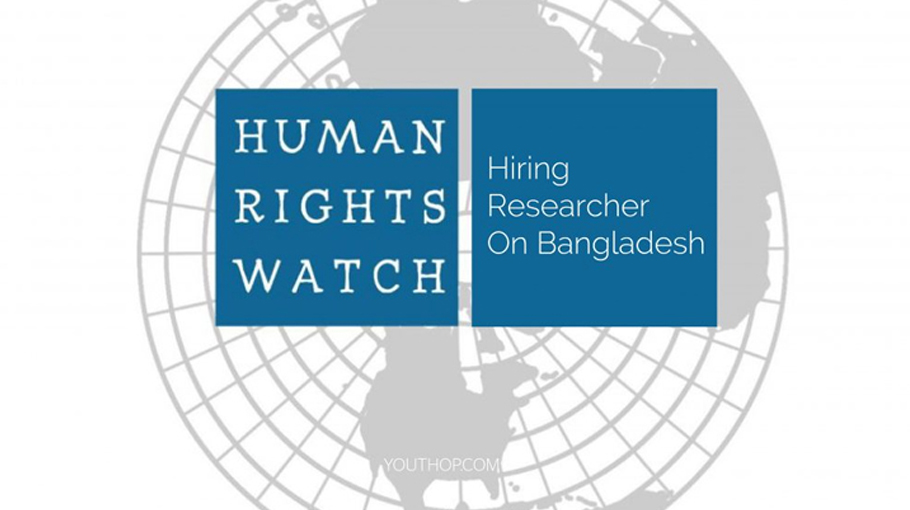Bangladesh should seek expertise, technical assistance from UN: HRW

Human Rights Watch (HRW) on Thursday said Bangladesh's interim government should seek expertise and technical assistance from the United Nations for its new commission of inquiry investigating all cases of enforced disappearances during the 15-year rule of Sheikh Hasina.
The interim administration, led by the Nobel Peace Prize laureate Muhammad Yunus, has announced a five-member team headed by a retired judge, which includes another former judge, a university teacher, and two human rights activists.
The government has also made a commitment to sign the International Convention for the Protection of All Persons from Enforced Disappearances, a landmark move after years of refusals by the previous government to recognize enforced disappearances, says a press release.
It has also agreed to support a UN fact-finding team in investigating abuses during recent protests, which earlier in August 2024 led Sheikh Hasina to resign as prime minister and flee the country.
“With this commission of inquiry, Bangladesh has an opportunity to pursue justice for the victims of enforced disappearances and their families, many of whom have desperately sought answers, only to be dismissed, threatened, and humiliated by officials,” said Meenakshi Ganguly, deputy Asia director at Human Rights Watch.
“The government should seize the opportunity to create a robust process with international expertise, including forensics, to investigate these abuses and identify avenues for reparations in collaboration with victims and their families.”
Odhikar, a prominent Bangladeshi human rights organization, estimates that 708 people were forcibly disappeared under Hasina’s rule.
While some people were later released, produced in court, or said to have died during an armed exchange with security forces, nearly 100 people remain missing.
The commission of inquiry should investigate every case, regardless of whether the person was returned, killed, or remains missing.
It should be additionally mandated with identifying all clandestine detention centers, and the interim government should immediately shut them down and release anyone still being held in incommunicado custody.
The commission should have the authority to make recommendations regarding the prosecution of suspects, reparations to victims and their families, the enactment of specific legislation, and institutional and other reforms that would prevent repetition of past violations.
The newly formed commission has said it would submit a report within 45 days.
To effectively carry out its mandate, the commission should be adequately resourced and authorized to obtain all information necessary, including to compel the attendance and cooperation of state officials and law enforcement as witnesses and to order the government, police, and other officials to produce records.
The commission should establish a variety of means through which to submit evidence so that the process is accessible and all interested parties have an opportunity to participate.
Given the entrenched impunity for security force abuses in Bangladesh, the interim government should request the UN Office of the High Commissioner for Human Rights and other UN human rights experts to provide technical support and monitoring of the investigation. The investigators should also work closely with Maayer Daak (“Mothers’Call”) and other organizations representing victims and their families.
Throughout the inquiry, the commission should collect views from victims about what forms of reparation would serve to meaningfully recognize the harm suffered, in addition to bringing those responsible to justice.
The commission should recommend the full range of reparations required by international standards, including restitution, compensation, rehabilitation, satisfaction, and guarantees of non-repetition.
The interim government should make a commitment to ensuring effective reparations, including carrying out Maayer Daak’s call for the creation of a memorial to commemorate victims of enforced disappearances and the suffering of their families, and to stand against the commission of disappearances in the future.
The report’s conclusions and recommendations should be made public and accessible and should require periodic updates on implementation. Evidence collected by the commission should be preserved and made available for judicial and other official investigations in Bangladesh and elsewhere, and the commission should identify an independent entity to safely hold the records following the completion of investigations.
Three victims of enforced disappearances – Michael Chakma, Mir Ahmad Bin Quasem, and Abdullahil Amaan Azmi – were released shortly after Hasina fled the country. In all three cases, authorities had for years denied having them in custody.
Speaking to the media, Chakma described severe torture while he was detained underground in a secret detention site called Aynaghar (house of mirrors) run by the military intelligence agency. Since he was released, he has had difficulties walking and reading and suffers from nightmares.
Both Quasem and Chakma said they were confined alone in near-constant darkness but could hear others being tortured, indicating that others may still be held in the secret detention center.




